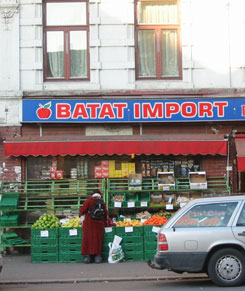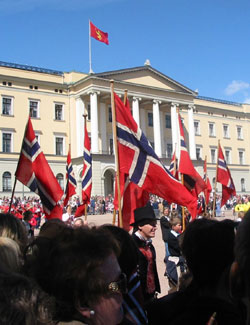Summer Programs
Fortress Europe: Immigration and Globalization in the New Europe
June 1-23, 2006
This three-week course examines the relationship between the European Union (EU) and globalization, In particular the course focuses on migration, one of the greatest challenges posed by globalization. Beginning with historical background on the EU, the course moves on to consider the EU’s growing role as an international superpower. Students then explore some of the contemporary political and social issues that challenge the EU--all from the unique vantage point of Scandinavia.
Norway is a fascinating location within Scandinavia and within Europe. Norway is historically, culturally, and linguistically linked to Denmark and Sweden, and all three countries have pioneered extensive social welfare states. Norway presents a unique combination of partial membership and systematic official opposition to the EU, and offers a critical environment in which to examine European integration. The Scandinavian countries have taken differing positions on integration. Denmark joined the European Community (EC) in 1973, but Denmark remains steadfastly “EU-skeptic” and has consistently rejected elements of European integration, including the single currency. Sweden considered joining the EC only after the end of the Cold War, unable before then to reconcile its neutrality policy with membership in a community sometimes riven by antagonisms. Sweden formally joined the EU in 1995, and has provided a unique voice in the Union, particularly on social and environmental issues. Norway has twice rejected full EU membership but is a de-facto member of the EU via the European Economic Agreement (EEA), which gives free access to EU markets, and via the Schengen Treaty, which mandates free movement of people within EU borders. These countries are often viewed as “reluctant Europeans,” long-standing democracies whose wealth and progressive social policies make for unusual perspectives within the European integration project. All three Scandinavian countries now face many challenges, including steadily increasing ethnic and cultural diversity.
 Central
Questions that guide analysis and exploration throughout:
Central
Questions that guide analysis and exploration throughout:
- What are the dominant ideologies underpinning the European project, and how do they influence the EU’s domestic and global agendas?
- What are the social consequences of European integration?
- Have EU immigration and asylum policies resulted in the development of an exclusionary ‘Fortress Europe’?
Faculty
Tim Szlachetko
Extras
This program is worth 1 course credit (4 semester hours or 6 quarter
credits).
If you would like to know more about the program fee, dates or other specific application information please visit the General Program Information page.
If you have interest in other short-term programs that we offer, use the following short-cuts:
| S-Civil Rights Movement | S-Ecuador and Bolivia | J-Ecuador | J-Bangladesh | Partners Internship Program |
2233 University Ave. W., Suite 210, St. Paul, MN, 55114
Email: [email protected] • Phone: (651) 646-8831 • Fax: (651)659-9421
